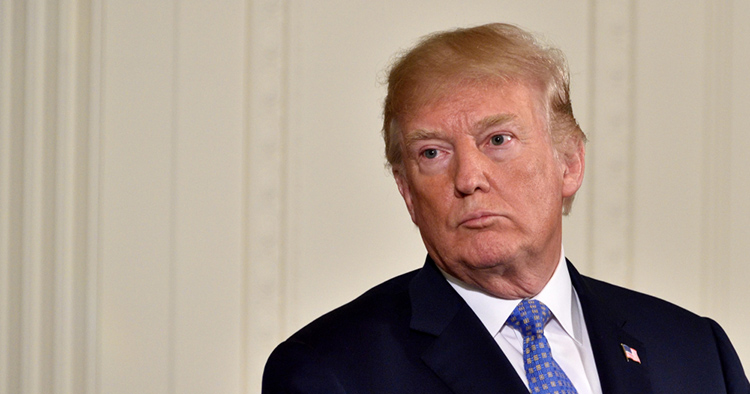Judge won't modify settlement blocking detention of immigrant children, notes possibility of waiver

President Donald Trump. Evan El-Amin / Shutterstock.com
President Donald Trump was dealt a setback Monday when a federal judge refused to modify a 1997 consent decree to allow parents who entered the United States illegally to remain with their children indefinitely in unlicensed facilities while immigration proceedings are pending.
U.S. District Judge Dolly Gee of Los Angeles said there was no basis to amend the decree in Flores v. Reno, which said most minors in immigration custody should be released without unnecessary delay, with first preference for release to a parent, followed by release to a legal guardian, an adult relative, a designated adult or a licensed program. The New York Times, the Washington Post, the Wall Street Journal, BuzzFeed News and Politico have coverage.
The Trump administration wanted to house immigrant children with their families in unlicensed residential facilities maintained by U.S. Immigration and Customs Enforcement. The decision to hold families together was an about-face from a former practice in which the administration detained the parents and separated the children, sending them to less restrictive facilities.
A different federal judge has ordered family reunification in Ms. L v. ICE. Because of Gee’s ruling, the government faces a new obstacle in its attempt to end what it termed the “catch and release” of immigrants coming into the country illegally. But Gee said the government could change its policy, and there were other options as well.
“Absolutely nothing prevents defendants from reconsidering their current blanket policy of family detention and reinstating prosecutorial discretion,” Gee said.
Gee also said the government has not made any attempt to find licensed facilities to hold families together.
And she noted yet another option. Parents could waive their children’s rights to placement in licensed facilities if they choose their right to reunification. “Given the situation arising from defendants’ earlier family separation policy, detained parents may choose to exercise their Ms. L right to reunification or to stand on their children’s Flores agreement rights,” she said. “Defendants may not make this choice for them.”
The Obama administration had also tried unsuccessfully to modify the settlement in 2015. Gee said the latest request for an amendment is no more than “a thinly veiled motion for reconsideration” of the 2015 decision and “it is unnecessary to replow the same familiar territory.” The 2015 decision gave the government up to 20 days to transfer minors to licensed facilities when there is an “influx of minors into the United States.”
The Justice Department argued that circumstances had changed since 2015 because the refusal to modify resulted in a three- to fivefold increase in the number of illegal family border crossings. But Gee said many factors could have explained the surge, “including civil strife, economic degradation, and fear of death in the migrants’ home countries.”
Gee added that the modification request is not suitably tailored to the changed circumstances. Instead, Gee said, the government defendants seek “to light a match to the Flores agreement and ask this court to upend the parties’ agreement by judicial fiat.”
“It is apparent that defendants’ application is a cynical attempt, on an ex parte basis, to shift responsibility to the judiciary for over 20 years of congressional inaction and ill-considered executive action that have led to the current stalemate,” Gee wrote. “The parties voluntarily agreed to the terms of the Flores agreement more than two decades ago. The court did not force the parties into the agreement nor did it draft the contractual language. Its role is merely to interpret and enforce the clear and unambiguous language to which the parties agreed.”
A Justice Department spokesman told the Wall Street Journal and Politico that the decision is being reviewed. The spokesman said the decision does appear to recognize that parents crossing the border illegally will not be released, and must choose between remaining with their children in custody or allowing separation.
Write a letter to the editor, share a story tip or update, or report an error.


